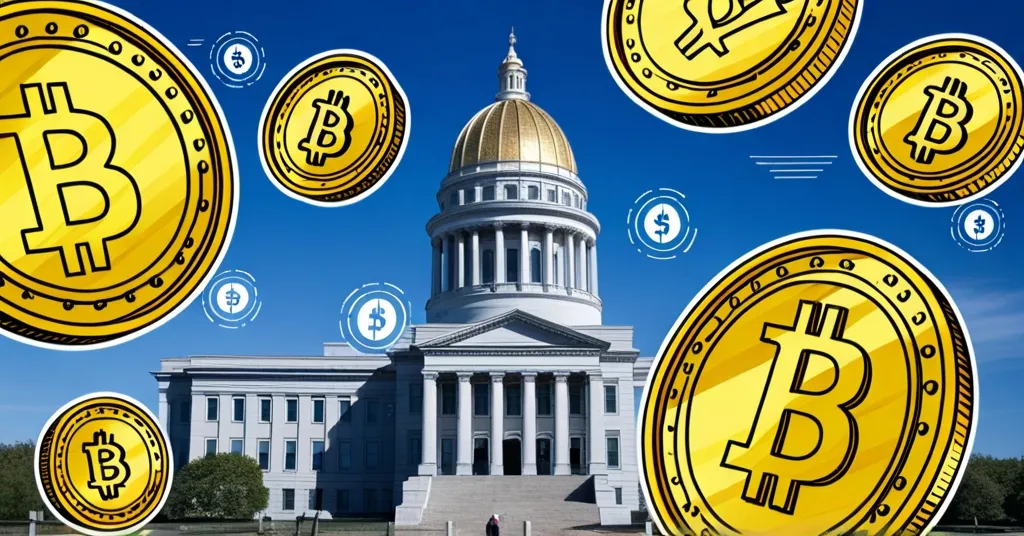Missouri’s Bold Move: Proposing Bitcoin Reserve to Combat Inflation

Missouri Proposes Bitcoin Reserve to Bolster State Finances Against Inflation
Missouri Representative Ben Keathley has introduced House Bill 1217, aiming to establish a Bitcoin Strategic Reserve Fund to diversify the state’s financial portfolio and hedge against the erosive effects of fiat currency inflation.
- Establishes Bitcoin Strategic Reserve Fund
- Enables state to accept cryptocurrency payments
- Requires Bitcoin storage for at least five years
Introduced on February 6, House Bill 1217 empowers the state treasurer to manage Bitcoin investments, funded through gifts and donations from government entities and Missouri residents. This strategic reserve aims to safeguard against inflation and diversify the state’s financial assets, acknowledging the limitations of traditional financial systems.
Under the proposed legislation, Missouri’s government entities must accept cryptocurrency for taxes, fees, and fines, with transaction costs borne by the payer. This could significantly boost cryptocurrency adoption, setting a precedent for other states.
The bill mandates a five-year storage period for Bitcoin in the reserve, emphasizing a long-term investment strategy rather than a quick cash grab. This approach underscores Missouri’s intent to leverage Bitcoin as a fundamental asset for financial resilience.
The state treasurer would also be authorized to invest public funds in Bitcoin, marking a pivotal shift in state financial management. If enacted, the bill would take effect on August 28, 2023, though this date may change.
Missouri’s initiative aligns with a broader trend across the U.S., with at least 16 other states, including Utah, Arizona, Kentucky, New Hampshire, North Dakota, Wyoming, and South Dakota, exploring similar Bitcoin reserve policies. Utah’s Representative Jordan Teuscher, for instance, introduced House Bill 230, aiming to integrate digital assets into the state’s public funds.
This movement reflects a growing recognition of cryptocurrencies as legitimate financial instruments. Driven by historical volatility and inflationary pressures of fiat currencies, states are increasingly seeking alternative assets like Bitcoin to safeguard their financial futures.
The recent introduction of the federal BITCOIN Act of 2024 in the U.S. Senate, which proposes a federal Strategic Bitcoin Reserve, further validates this trend. This federal initiative could provide additional context and support for state-level efforts like Missouri’s House Bill 1217.
However, integrating Bitcoin into state finances isn’t without challenges. Critics, including economic experts, argue that Bitcoin’s notorious volatility poses a significant risk to public funds. They emphasize the need for robust cybersecurity measures to protect these digital assets, particularly given the decentralized nature of Bitcoin storage as proposed in the federal BITCOIN Act.
Economic analysts and cryptocurrency advocates view these legislative moves as forward-thinking approaches to managing economic risks. Bitcoin’s deflationary nature—meaning its supply is limited and cannot be inflated by central banks—could serve as an effective hedge against inflation. Its potential to disrupt traditional financial systems is also seen as a driving force for change. The increased state and federal investment could drive up demand and prices, leading to greater mainstream adoption and acceptance of cryptocurrencies.
Yet, there’s a darker side to consider. The environmental impact of Bitcoin mining, powered largely by fossil fuels, raises ethical concerns about investing public funds in such a volatile asset. Additionally, the hype surrounding cryptocurrencies often leads to unrealistic expectations and scams, which states must navigate carefully to avoid financial pitfalls.
As Missouri dives into the crypto pool with a cannonball, it’s clear the state isn’t just testing the waters. Whether this bold move sets a new standard for state financial management or serves as a cautionary tale remains to be seen. But in embracing Bitcoin, Missouri is championing the principles of decentralization, freedom, and effective accelerationism (e/acc), while acknowledging the unique roles altcoins and other blockchains play in this financial revolution.
Key Takeaways and Questions
- What is the primary goal of Missouri’s House Bill 1217?
The primary goal is to establish a Bitcoin Strategic Reserve Fund to diversify the state’s investment portfolio and hedge against fiat currency inflation, which means protecting the value of state funds from being eroded over time due to the declining value of traditional money.
- How would the Bitcoin Strategic Reserve Fund be funded?
The fund would be supported through gifts and donations from government entities and Missouri residents, allowing the state to build its reserve without relying solely on taxpayer money.
- What are the requirements for Bitcoin storage under the proposed bill?
Bitcoin must be stored for a minimum of five years from the date it enters state custody, reflecting a long-term investment strategy rather than a quick cash grab.
- What other states are exploring similar Bitcoin reserve policies?
At least 16 other U.S. states, including Utah, Arizona, Kentucky, New Hampshire, North Dakota, Wyoming, and South Dakota, are considering similar initiatives, indicating a national trend towards integrating digital assets into state financial management.
- What is the potential impact of this bill on Missouri’s financial strategy?
The bill represents a significant step towards integrating cryptocurrency into the state’s financial strategy, potentially offering a hedge against inflation and diversifying investment options, which could position Missouri as a leader in financial innovation.
- How does Bitcoin’s role as a store of value compare to other cryptocurrencies?
Bitcoin is often seen as digital gold due to its limited supply and deflationary nature, making it a unique asset for long-term value storage compared to many altcoins which may focus on other uses like smart contracts or faster transactions.
- What are the main risks associated with a state-managed Bitcoin reserve?
The primary risks include Bitcoin’s volatility, which could lead to significant financial losses, and the need for robust cybersecurity measures to protect these digital assets from theft or hacking.



